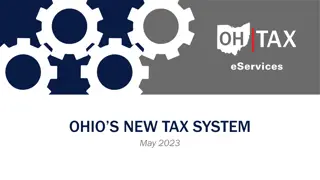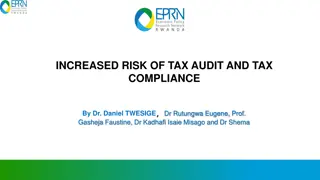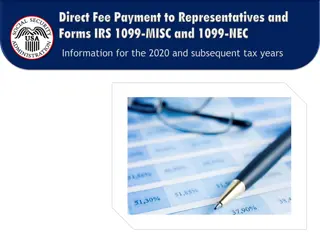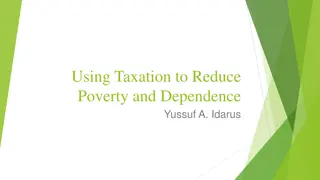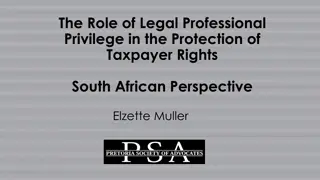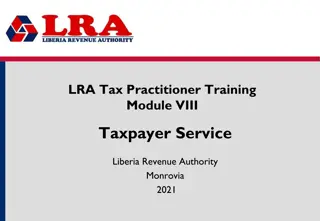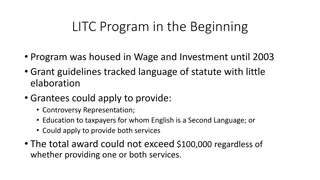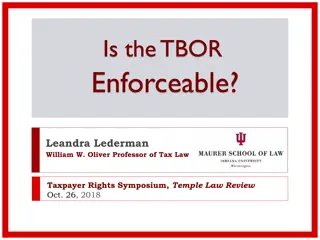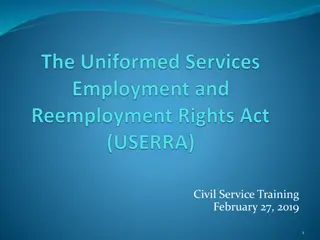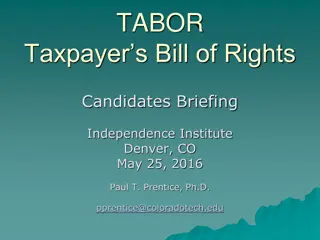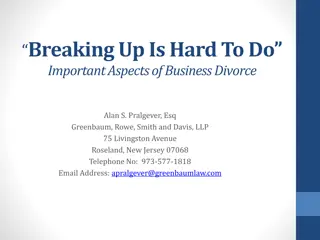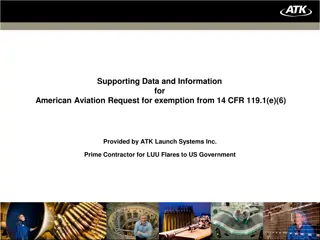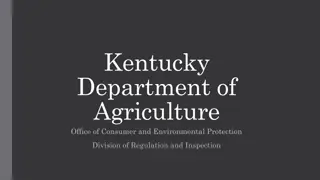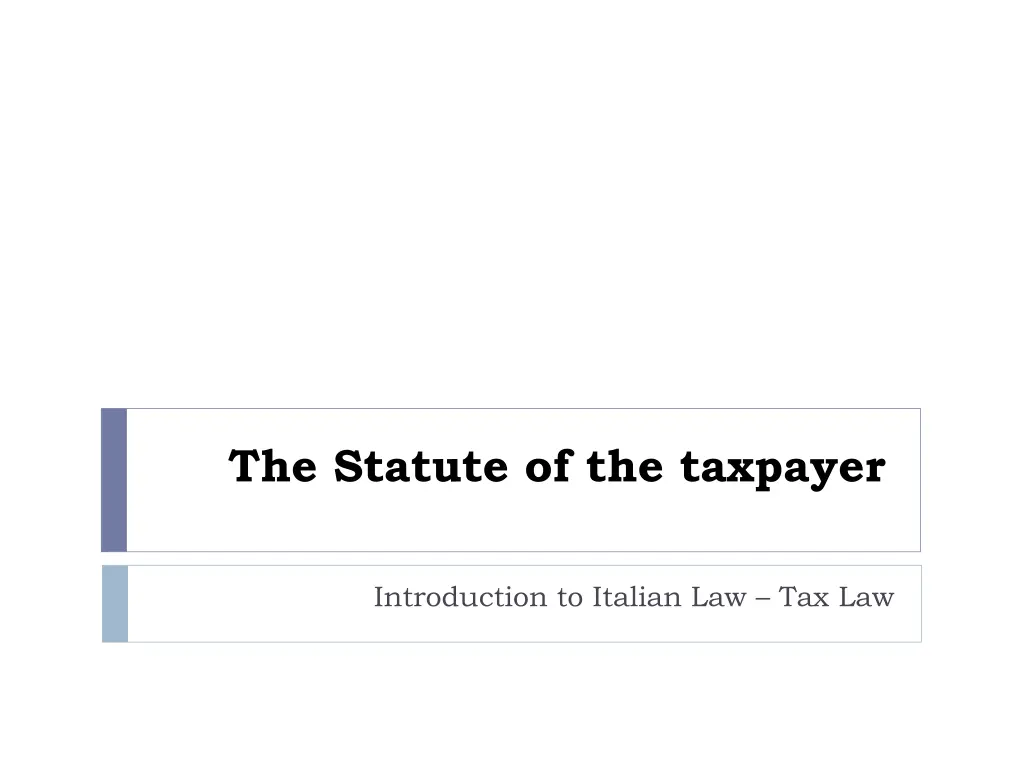
Overview of Italian Taxpayer Statutes and Rights
Explore the Italian taxpayer statute and rights in tax law, including key principles, protections, and duties, with insights on retroactive laws, transparency, and taxpayer safeguards. Learn about the statutory guidelines governing taxation in Italy and the implications for taxpayers.
Uploaded on | 2 Views
Download Presentation

Please find below an Image/Link to download the presentation.
The content on the website is provided AS IS for your information and personal use only. It may not be sold, licensed, or shared on other websites without obtaining consent from the author. If you encounter any issues during the download, it is possible that the publisher has removed the file from their server.
You are allowed to download the files provided on this website for personal or commercial use, subject to the condition that they are used lawfully. All files are the property of their respective owners.
The content on the website is provided AS IS for your information and personal use only. It may not be sold, licensed, or shared on other websites without obtaining consent from the author.
E N D
Presentation Transcript
The Statute of the taxpayer Introduction to Italian Law Tax Law
Preview Have taxpayers some forms of protection? Are there some duties on the tax administration? What to do in case tax laws are unclear? 2 31/05/2025
The statute of rights of taxpayers The statute law n. 212/2000 has stated some general principles about taxation, in order to implement artt.3,23,53,97 It.Const. These rules are general principles of tax legal order , and can be modified only explicitly and never by special statutes Unfortunately, the statute has been approved by an ordinary law, not a constitutional one, and for this reason it could be repealed by following statutes 3 31/05/2025
Charters content 1/2 Rules referred to legislation Retroactive laws (art. 3) Transparency (art. 2) Use of Law decrees (art. 4) 1. 2. 3. Principles referred to the acts and activity performed by tax administration Informed taxpayer (art. 5) Justification of acts (art. 7) Good faith and reliance (art. 10) 1. 2. 3. 4 31/05/2025
Charters content 2/2 Rules referred to the taxpayers Advanced ruling (art. 11) Taxpayers rights during tax audits (art. 12) Non resident taxpayers (art. 14) 1. 2. 3. Other rules Tax avoidance measure (art. 10-bis) Taxpayers guarantor (art. 13) 1. 2. 5 31/05/2025
Rules referred to legislation 1/2 Principle of irretroactivity (art.3) Tax rules can t be retroactive. This principle, as any others contained in the Statute, may however be overruled by subsequent ordinary law; Anyway art. 53 It. Const. is a substantial limit to retroactive taxation. A taxation based on facts which took place prior to the enforcement of the law could be unconstitutional if it is possible to presume that the taxable capacity is no longer present at the moment of the required payment; The rule of irretroactivity doesn't apply to interpretative laws, id est laws enacted to clarify the precise meaning, among others, of previous laws. 6 31/05/2025
Rules referred to legislation 2/2 Transparency (art. 2) Tax laws and other acts having the force of law must be clear and transparent i.e. tax laws must have an index; law referrals should be explicit Law decrees (art. 4) Law decrees cannot be used for introducing new taxes or extend an existing tax to further classes of taxpayers 7 31/05/2025
Principles referred to the acts and activity performed by tax administration 1/4 Informed taxpayer (art. 5) Tax authorities shall put the taxpayers in the condition to accomplish their duties; Tax authorities shall grant a complete and easy access to every legal and administrative rule, as well as interpretative acts (circolari, risoluzioni, etc.), also by electronic means 8 31/05/2025
Principles referred to the acts and activity performed by tax administration 2/4 Justification of acts (art.7) Every act issued by the tax administration shall be justified,with the indications of the relevant facts and juridical rules that have been applied. If, for the justification, reference is made to another act, the latter must be delivered too Any act (of assessment and of any other kind) has to make reference to the tax authority to which address a review, and the proceedings rules to file a jurisdictional claim against the act 9 31/05/2025
Principles referred to the acts and activity performed by tax administration 3/4 For example, the tax officers have to explain the reasons that justify the verification notice; If there is no reason for assessment, or if it is inadequate, the verification notice is to be considered invalid; Invalidity can be claimed by means of an appeal to the competent tax commission. 10 31/05/2025 31/05/2025
Principles referred to the acts and activity performed by tax administration 4/4 Good faith and reliance (art.10) The relationship between tax administration and taxpayers has to be inspired to good faith and reliance According to this principle, if the tax authority gives a certain interpretation and then changes opinion, no penalty can be applied to the taxpayer who relied on the previous opinion In any case, no penalties are applied if the violation is due to an objective uncertainty on the significance of the rule assumed to be violated 11 31/05/2025
Rules referred to the taxpayers 1/2 Advance ruling right of questioning (art.11) The taxpayer can file a request of advance ruling, asking the tax administration to give the correct interpretation of a rule, when there are objective reasons of uncertainty. By presenting a request for questioning, the taxpayer has the possibility to Administration to find out the solution to his/her specific and personal case, regarding which objective conditions of uncertainty exist. question the Financial 12 31/05/2025
When the questioning can be lodged Two conditions: 1. Concrete and individual case; 2. Objective conditions of uncertainty. These administration has fully provided the interpretative solution of similar cases to the one set out in the questioning conditions are not verified if the tax 13 31/05/2025 31/05/2025
The information to include The request shall be referred to a concrete and not hypothetical case, and all the relevant facts must be clearly set forth; The queries falling within the competence of the Italian RevenueAgency can concern in particular: Income tax; Value added tax; Irap; Registration fee. For taxes the Italian Revenue Agency is not competent for, the taxpayer can submit a query to the body in charge of their management (for ex.The Customs Office for excise duties) 14 31/05/2025
The administrations response Within 90/120 days from the lodging of the questioning, the relevant Directorate must provide a written and motivated response to the taxpayer consent by silent : in case of silence after 90/120 days, a deemed affirmative answer is considered to be issued; In case several queries concerning the same or similar issue are put forward, the I.R.A. can provide a collective response (circolare o risoluzione) 15 31/05/2025
The effects of questioning The response of the Italian Revenue Agency affects exclusively the taxpayer questioning, and only with regard to the specific and individual case presented; The response provided does not bind the taxpayer to conform. The taxpayer is free to adopt a different behaviour; However, the answer provided binds the actions of the Italian Revenue administration has delivered assessment based on different basis can be issued who has submitted the Agency: once interpretation, no the tax its 16 31/05/2025
Types of rulings Ordinary ruling (interpretative ruling): the taxpayer files a formal request to obtain the Revenue s opinion regarding the correct interpretation of an objectively uncertain tax provision he needs to apply; Controlled foreign companies ruling: applies to resident shareholders wishing to avoid the application of the Cfc rules; Anti avoidance ruling - Advance clearing ruling: taxpayer may seek advance clearing from the Italian Revenue Agency in order to exclude the application of anti-avoidance provisions 17 31/05/2025
Rules referred to the taxpayers 2/2 Rights and guarantees of the taxpayer in the course of a field audit (art.12) To be informed on the reasons of the audit,that can t last longer than 30 working days (+ 30 days of extension):at the end of this period,the audit must come to an end. To be assisted by a consultant To verbalize comments into the audit report: tax auditors must take note of the observations and requests made by the taxpayer To file comments and requests within 60 days from the end of the audit: at the end of the audit, the tax auditors must draw up a tax audit report whereby the outcome of the audit activity must be detailed and the findings (if any) must be illustrated and motivated 18 31/05/2025



